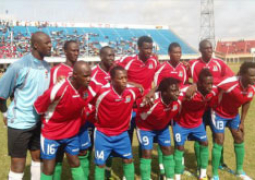The criminal trial involving nine foreign nationals for alleged trafficking in cocaine and for being in possession of two and half tonnes of cocaine, continued yesterday at the Banjul Magistrates’ Court, before principal magistrate Taiwo Agabala.
The nine accused persons are Ephriam Micheal Chiduben, a Nigerian national, Juan Carlos Sanchez; Eric Bottini, Dose Fermin, Juan Carlos Diaz, and Esteaban Zavala, all Venezuelan nationals; George Sanchez, a Mexican-Liberian national, as well as Rudy Rasoehamid Gazi and Dennis Wilgo Winter, both Dutch nationals.
They have pleaded not guilty to charges of conspiracy, trafficking in prohibited drugs, trafficking in drugs, dealing in prohibited drugs, having firearm without authority, importation of firearm without authority, among others.
The case, which has so far seen the testimonies of nine prosecution witnesses, continued with the testimony of the tenth prosecution witness, Lamin J. Gassama, a narcotics officer.
Gassama told the court that on 21st July 2010, as a narcotics officer, he was assigned to investigate the accusation against the accused persons, and also instructed to obtain the cautionary statements from the 2nd accused person.
“In doing so, I invited an independent witness by the name Gibril Colley and read the cautionary wordings to the 2nd accused person in English, he (the second accused) said he understood and thumbprinted,” the witness said, adding that the second accused narrated the facts of the matter and he (the witness) recorded it in English, and read it again for the second accused.
Noting that the independent witness signed the statement and he also did the same, Gassama further told the court that he could recognise the said statement.
At that juncture, the Director of the Public Prosecutions, M. Mikailu, applied to tender the statement as an exhibit, but this was strongly objected to by defence counsel Lamin Camara, who argued that the said statement is not admissible, as it is against the provisions of section 31(2) and section 33 of the Evidence Act.
Camara further argued that the said statement was not obtained voluntarily as the second accused was subjected to the most brutal inhuman treatment.
“The statement was not written out of the free will of the second accused person. I am informed by the second accused that he was induced and tortured,” Camara told the court.
He urged the court to order a mini-trial, noting that even without a mini trial, the statement could not be admitted because it does not comply with the judges rule. Defence counsel Camara urged the court to reject the statement.
The Director of Public Prosecutions in response told the court that the issue of a mini trial is squarely under the provision of section 33 of the Evidence Act. He submitted that a mere statement that the second accused was tortured or induced is not sufficient for the court to order a mini trial.
He said despite the fact that the defence counsel received information from the accused person that he was subjected to torture, inducement and inhuman treatment, the defence never informed the court that his clients were tortured.
He urged the court not to enter a voire dire.
The trial magistrate overruled the defence objection, and admitted the cautionary statement of the second accused, which was then marked as exhibit D.
The case continues on 17th May.


